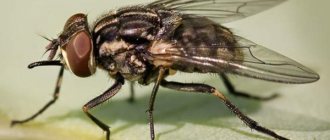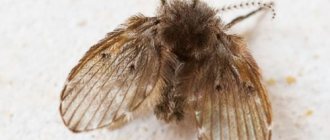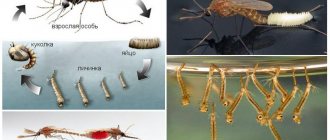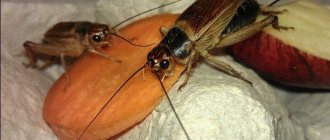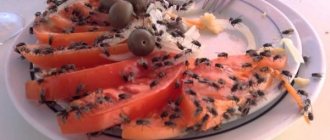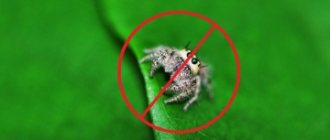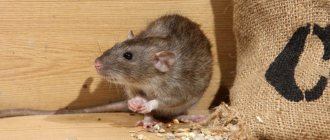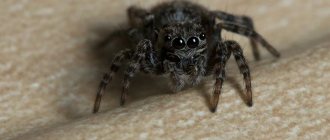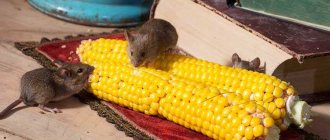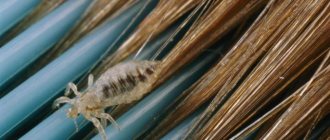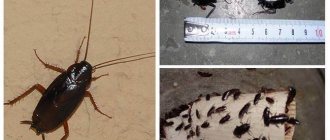Where do flies come from in the house?
At the dacha or in a country house, one or another number of flies almost always lives. They either fly themselves through open windows and doors, or they are brought by those who enter the house. In the warm season, insects enter through open windows and doors. The likelihood of flies increases if there are:
- outdoor toilet;
- cesspool;
- compost heap;
- garbage bins;
- buildings in which farm animals and poultry are kept.
On food
Flies are attracted to a private house by the same thing that attracts flies to an apartment - the smell of food. Insects are guaranteed to fly to places where:
- Dirty dishes accumulate in the sink;
- garbage is not taken out for several days;
- Fruits, meat, fish, and leftover food are in the public domain.
You can bring eggs or fly larvae into your home:
- with the harvest;
- with purchased vegetables, berries, fruits;
- with soil collected from the garden for indoor plants;
- on outdoor shoes, clothing, and pet fur.
Even a bouquet of flowers collected in the garden can cause flies to appear in the house.
Aerosols and sprays
A quick and simple product that is convenient to use to kill flies. No preparation or complex manipulations are required to process the room.
Aerosol Dr. Klaus
A powerful jet is able to penetrate into secluded places in the room and quickly destroy all domestic parasites. Spray the room for a few 10-15 seconds and leave the room for 30 minutes. Pre-close windows and doors to stop air from entering. 15-30 minutes after treatment, ventilate the room for half an hour.
In the hot summer, a large number of insects, including flies, fly everywhere, but with the onset of the cold season they disappear.
How dangerous are flies?
Flies not only cause discomfort and irritation with their buzzing and intrusiveness. Due to the characteristics of their reproduction and feeding, these insects crawl through carrion, garbage dumps, rotting plants and fruits, and feces.
Naturally, dirt and a huge amount of bacteria remain on their hair-covered body and paws, which they leave wherever they sit. And this could be dishes or food.
In addition, flies are carriers of pathogens of dangerous diseases, such as:
- dysentery;
- anthrax;
- typhus;
- cholera;
- helminthiasis;
- tuberculosis.
Some types of flies bite, and their sting can cause an allergic reaction.
What harm do flies cause and why you need to get rid of them quickly
Since flies can be seen in abundance in garbage dumps, feeding on decomposing meat and vegetable waste, manure, it is clear that many dangerous pathogenic microbes remain on their paws, proboscis and in the body. Therefore, they serve as carriers of dysentery, E. coli, typhoid, botulism, tuberculosis, leaving infectious agents on dishes, tables and food.
In the insect’s body, pathogenic microbes persist for 2–3 weeks and are transmitted through feces left on furniture and dishes. The bacteria live on the paws for several days, so one individual can infect a fairly large area.
Preventing the appearance of flies in the house
To reduce the risk of flies in the house, you must first of all maintain cleanliness - wash dishes immediately after eating, do wet cleaning, and do not accumulate garbage. It is very important to block insects from entering the room - residents of wooden houses need to carefully seal all the cracks.
You should also adhere to some rules, which, if you live outside the city, apply not only to order in the house, but also in the adjacent area.
Closed doors
In hot weather at the dacha, many people leave not only the windows open, but also the doors. This gives flies and other insects an additional way to enter the house. There are two options: either close the doors or hang magnetic curtains on them.
This curtain is made of transparent, breathable material and equipped with magnetic locks. People, cats and dogs will be able to easily get into the house, but the path will be closed to flies.
Cleaning up after pets
If the owners of a private house have a pet that walks in the yard, they will need to be cleaned after each walk, despite the fact that the territory is not public. The fact is that excrement is very attractive to flies, which flock to the smell from afar.
Clean trash cans
Those who have garbage cans in their yard should monitor their condition. To quickly get rid of flies, each tank should be equipped with a tight-fitting lid. Waste must be removed regularly to prevent its accumulation. The same rules apply to trash cans used in the home.
Cleaning the garden and vegetable garden
Timely mowing the lawn and trimming too tall grass in the area will help get rid of flies on the street. After all, it is in the grass that flies often hide. The compost pit should be located as far as possible from the house. If there are fruit trees near your house, you need to harvest them on time and regularly throw away rotting fruits that fall to the ground. Maintaining order in the area in the summer will significantly reduce the number of flies seeking refuge in the house in the fall.
Site cleaning
Avoiding water stagnation
Flies love dampness, and especially blooming, stale water. Therefore, if there is a pond or swimming pool at your summer cottage, you must carefully monitor the condition of the water in it. Also, do not allow water to stagnate at the bottom of buckets, trash can lids, or uncleaned roof drains.
Storing fruits and vegetables in closed containers
It is very important to properly store harvested fruits and vegetables. It is advisable to do this in a specially equipped cellar or in a refrigerator. If this is not possible, then at least put them in closed containers and regularly check them, selecting those that are rotting.
"Winter sleep" of flies
Where do flies spend the winter? Where do they go during the cold season? All flies experience unfavorable winter conditions differently, therefore the process of wintering in all species of these insects occurs in different ways. The state into which most flies fall in winter is called diapause - it is similar to suspended animation in animals, that is, the period when an individual simply sleeps.
At this time, house flies, like other representatives of the fauna, hibernate.
Their metabolism and other vital processes slow down, which increases the body's resistance to adverse external conditions. This feature allows them to withstand frosty winter days. The flies that are found in our homes are classified as houseflies or houseflies.
Scientists have found that the lifespan of an adult is approximately 1 month.
But many insects of this species are able to live much longer. Then the question arises of how flies overwinter. So, first, some general information. The female makes her last laying of eggs in the autumn.
Adults and small larvae do not die during the cold season, but fall into a long winter hibernation. Starting from mid-October, you will not see a single fly on the street. House flies easily adapt to any climatic conditions, hiding in various cracks, window frames and similar places where a constant room temperature is maintained throughout the cold season.
Flies that live in fields, gardens and orchards, just like indoor insects, sleep in winter.
They also try to overwinter in the ground, but severe frosts are destructive for them. Winter hibernation in insects is deep and requires special conditions for the individual to wake up. Usually, when daylight hours increase and a certain temperature sets, which happens in the spring, flies begin to wake up. After long winter cold, the insect does not immediately come to its senses. At first, the fly is half asleep.
After some time, they get used to it, finally wake up and begin to live a normal life, and the larvae continue their development after a long break.
How to get rid of flies in the house?
There are many ways to fight flies in the house, among them there are both gentle, safe for people and animals, and more powerful, but toxic.
Fly swatter
Perhaps the most traditional tool for fighting flies in the country is a fly swatter. An object similar to a spatula, made of plastic or rubber, with which you need to arm yourself and go on the attack. There are more advanced devices that, upon contact with an insect, shock it with an electric current.
Devices and instruments for controlling flies
In stores you can find many modern devices designed to kill flies. They have different operating principles, but the same result – the number of insects is noticeably reduced.
Fly traps
Traps are an effective way to control flies in your home. The most popular are adhesive tapes, which can be easily hung indoors. Traps with bait will also help get rid of flies in a wooden house. Insects, attracted by the smell, fly inside but cannot get out. You can buy a ready-made structure or make a trap yourself from materials that can be found in any home.
Insecticidal lamps
These devices help kill flies both indoors and outdoors. The bait here is an ultraviolet lamp. Insects flock to the light and die when they come into contact with a surface that is under tension or fall into the viscous sticky mass inside the trap.
Electric trap
Flies are also attracted to this device by bright light. But inside the device there is a fan, thanks to which insects are sucked into the structure when they approach it. The flies end up in a special container that can be easily removed and cleaned.
Fumigator
Another popular device that helps remove flies and other flying insects. A plate soaked in insecticide or a container with liquid is inserted into the device. After being plugged into the outlet, the fumigator coil heats up and the active substance that acts on flies begins to evaporate.
Fumigator
Aromatic fly repellents
Many housewives fight flies with the help of odors. For this you can use essential oils, herbs, spices, and chemicals. The most effective scents are:
- eucalyptus;
- citrus fruits;
- carnations;
- mint;
- wormwood;
- tansy;
- lavender;
- laurel;
- turpentine;
- ammonia.
These funds can also be used for prevention. For example, if you wipe the window frame with water to which a few drops of essential oil have been added, flies are unlikely to risk flying into it.
Poisons
Anyone who does not want to use chemicals in the house can prepare their own poison. Homemade fly repellents work no worse than store-bought ones, but do not pose a danger to people. The following recipes will help you fight flies in your dacha:
- strips cut from newspaper or napkin are treated with a mixture of water, honey and saccharin;
- 3 tbsp. l. milk, 5 tsp. baking soda, 0.5 tsp. formalin (pour into saucers, add pieces of bread).
Milk or sweetened water with black pepper is also used to kill flies.
Traditional methods of getting rid of flies
You can get rid of flies in a country house using folk recipes, for example:
- pour vodka into a spray bottle and spray in the room;
- plant geraniums or miniature varieties of tomatoes at home;
- Mix the hazel decoction in equal proportions with vinegar and spray the resulting liquid over the room.
Another effective way is to have a carnivorous plant at home (Venus flytrap, sundew).
Professional fighting methods
The most effective ways to control flies include the use of special insecticidal preparations containing substances that cause the death of insects. They are available in the form of aerosols, powders and granules for preparing a solution. Such products are toxic, so they must be handled with care.
Fly treatment
Attention! It makes sense to use insecticides when there are a lot of flies at home, or other methods have already been used and did not produce results.
Controlling flies outdoors
Naturally, the number of flies on the street near the house is much greater than in the house itself. They also cause a lot of inconvenience, not only to people, but also to farm animals (if there are any). The following measures will help you cope with insects:
- keep the area clean (timely get rid of weeds, mow the lawn, collect fallen leaves);
- close garbage containers;
- regularly treat the cesspool and street toilet with a disinfectant (preferably containing chlorine);
- use spirals or pyrotechnic fumigators;
- monitor the cleanliness of the premises where animals are kept;
- As a fly repellent, you can plant mint, basil, lavender on the street near the house, and bird cherry and elderberry along the perimeter of the site.
Of course, it is impossible to completely get rid of flies in your yard, but these steps will help reduce their number.
